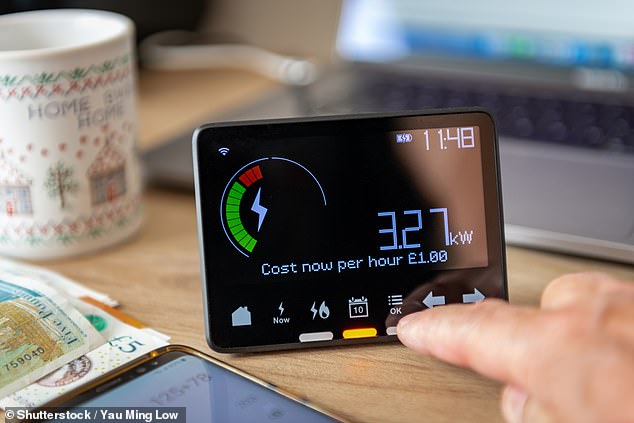- The number of smart meters installed decreased in the first months of 2024
- Energy providers say most people who want a smart meter already have one
The number of smart meters installed in homes fell 10 percent in the first three months of the year, continuing a long-term decline in new installations.
The latest government figures show that large energy companies installed 780,000 smart meters between January and March, up from around 870,000 in the previous three months.
More than half (56 percent) of all energy meters are now smart meters, and another 7 percent are smart meters that function like traditional “dumb” meters.
Peak: We may have reached the peak in the number of homes that will have smart meters voluntarily installed, according to major energy companies.
The number of new smart meters installed has fallen overall from a peak in 2017.
Last year, energy regulator Ofgem fined six of the UK’s largest energy companies £10.8 million for failing to meet smart meter installation targets.
The Government wants 80 per cent of homes to have smart meters by the end of 2025.
Smart meters were introduced in 2011 as a way to help households stay in control of their energy bills and, in turn, keep them low.
They are installed in homes to replace more traditional meters, including prepaid key meters.
Suppliers say they provide more accurate and up-to-date readings, so customers only pay for the energy they have consumed.
But energy companies are struggling because most households that would choose to have a smart meter already have one, with resistance from many of the rest.
Last summer, energy suppliers said they had exhausted the “low-hanging fruit” of households wanting a smart meter, according to a National Audit Office report.
The regions with the highest proportion of smart meters are Bolsover, Chesterfield, County Durham, Rotherham, North Kesteven and Mansfield, all with 74 per cent or more of their household electricity meters being smart meters.
As a general rule, the higher the population density of an area or the more remote it is, the fewer smart electricity meters are installed.
In inner London, some regions have only 30 to 40 per cent of homes equipped with smart meters.
The lowest smart meter installations (>20 per cent) are on islands off the coast of Britain: the Isles of Scilly, Na h-Eileanan Siar, the Orkney Islands and the Shetland Islands.
This is due to “operational reasons,” according to the Department of Energy Security and Net Zero.
The charity Citizens Advice said it is concerned that households are losing out because smart meters do not work as they should.
Gillian Cooper, energy director at Citizens Advice, said: “Smart meters can help households save money on their energy bills, but current figures show millions are missing out on these benefits because their meters are not working as they should.” .
‘This is just the tip of the iceberg. Our research shows that 20 per cent of homes with smart meters still have to submit regular manual readings. And almost a third experienced problems with their screen at home.
‘Suppliers have taken too long to fix the problems with people’s smart meters. We need new rules to ensure energy suppliers identify and fix problems as quickly as possible.’
A Smart Energy GB spokesperson said: ‘More than 35 million smart meters have been installed in homes and businesses across the country since the start of the rollout. This is a significant achievement for such a complex national infrastructure upgrade. The vast majority of smart meter owners (8 out of 10) believe that the implementation has been a positive step for the country.
“Smart meters are bringing many benefits to British homes and small businesses, including helping to manage energy use and access to smart products and more flexible energy tariffs.”
Do I have to get a smart meter?
Smart meters are not mandatory and it is up to you to install one.
Your provider will likely offer you one if you don’t already have one, but you have the right to decline.
If you refuse, remember that you won’t have access to all energy rates, meaning you could end up paying more for your energy than you might otherwise.
Earlier this month, Chris O’Shea, director of British Gas parent company Centrica, said every home should have a smart meter to help the Government meet its net zero targets.

